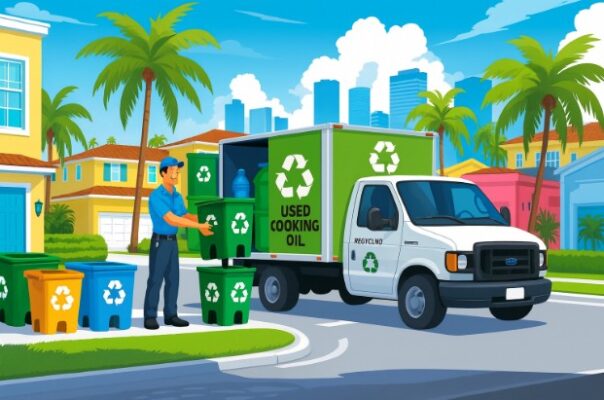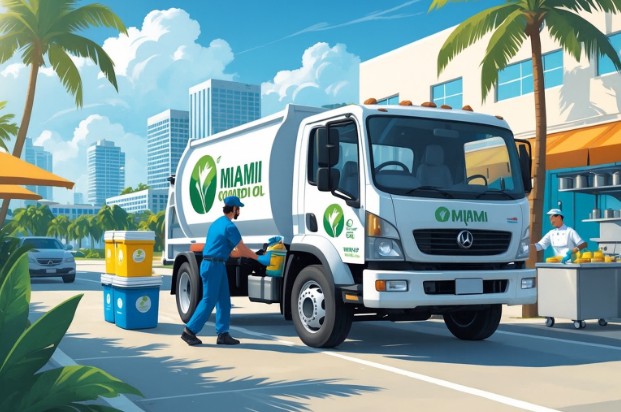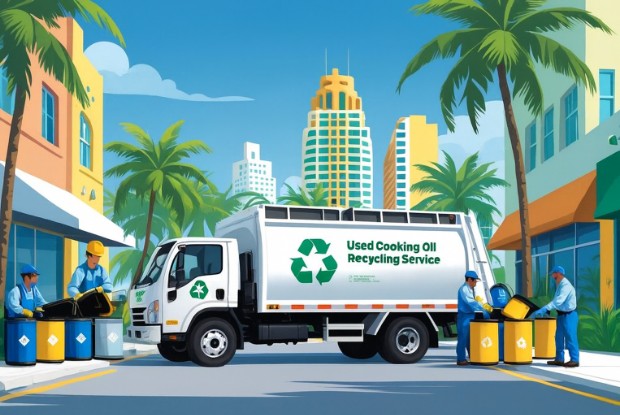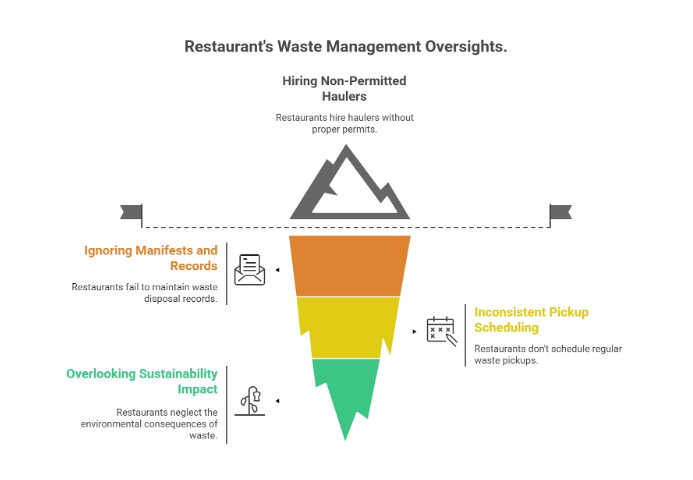
Used Cooking Oil Pickup Near Me: How to Choose the Right Miami Service for Efficient Recycling

Finding a dependable used cooking oil pickup service in Miami can save restaurants and businesses a lot of time and money.
The right service arrives on time, holds the necessary permits, and utilizes eco-friendly recycling practices to keep kitchens running smoothly and in compliance with local regulations.
This way, waste gets handled safely and turned into renewable resources. Both businesses and the environment benefit.
When you’re picking a company, price isn’t everything. Service reliability, the types of containers they offer, and whether their customer support is actually helpful all matter a lot.
Miami’s food scene is diverse, so you need a partner who understands local demands. Flexible scheduling is key to avoiding kitchen disruptions.
It’s not just about getting rid of the oil—knowing what happens to it after pickup matters, too.
Responsible companies recycle oil into clean energy or useful products, which cuts down environmental impact.
Key Takeaways
- Reliable pickup services help kitchens run smoothly and stay compliant.
- Quality and recycling methods matter more than just cost.
- Proper disposal supports sustainability and protects the environment.
Why Reliable Cooking Oil Pickup Matters in Miami

Reliable cooking oil pickup is a must for Miami restaurants and businesses. It keeps kitchens clean and helps avoid legal headaches and work interruptions.
Proper disposal also protects the environment and ensures smooth operation.
Preventing Overflows and Fines
Used oil builds up quickly if it is not collected on time. Overflowing containers can spark fires or cause severe spills, which are both expensive and hazardous.
Miami-Dade hands out fines for improper storage or disposal. If you skip scheduled pickups, you could face penalties that eat into your budget.
Reliable pickup also keeps containers locked and deters theft, which helps prevent overflows.
Adhering to a regular removal schedule reduces the risk of fines and maintains a safer workplace. It also saves you from extra cleanup costs.
Ensuring Compliance With Miami-Dade FOG Rules
Miami-Dade enforces strict rules about Fat, Oil, and Grease (FOG) to protect water systems. Businesses must manage used oil properly to avoid blockages.
Reliable pickup services help you meet these rules. Proper disposal prevents oil from entering sewer lines, thereby avoiding backups and damage.
If you don’t comply, you could face fines or even legal action. Many services use locked, hurricane-rated containers that meet local codes, which is especially useful during storms.
Protecting Kitchen Operations
Clean, safe workspaces ensure kitchens run smoothly. Overflowing oil or bad disposal disrupts routines and puts staff at risk.
Good pickup services set a consistent schedule, so you always know when your oil will be picked up. This means less downtime spent cleaning up or waiting for trash removal.
Professional disposal also keeps grease traps and pipes clear, which saves you from costly repairs. That’s a big deal if you want to avoid kitchen shutdowns.
Miami kitchens trust Grease Pros Recycling’s used cooking oil pickup service for reliable compliance and clean recycling. Turn waste into renewable fuel today—contact us to schedule.
If you’re ready to get started, call us now!
What Permits Do Miami Oil Pickup Services Need?

Miami’s used cooking oil pickup services must stick to strict rules to operate legally. These include permits, paperwork, and steps to protect customers from illegal dumping.
GDO Permits and Compliance
Grease Disposal Operators (GDO) in Miami need specific permits to collect and transport used oil. They register with local and state agencies, like the Florida Department of Environmental Protection.
These permits make sure companies follow safety and environmental standards. They must use approved containers and label trucks properly.
Permits prove the transporter can handle grease safely. Before hiring, always ask for proof of GDO permits.
Required Manifests and Chain-of-Custody
Pickup services document every step with manifests, tracking oil from collection to recycling. These logs show who handled the oil and when.
Chain of custody helps prevent illegal dumping and fraud. Manifests include the generator’s name, pickup date, transport method, and recycling destination.
Regulatory agencies require these records for proper disposal. Miami businesses should ensure that their haulers provide manifests to remain compliant.
Penalties for Using Unlicensed Haulers
Hiring unlicensed haulers can put both the company and the customer at risk. Miami and Florida law penalize the improper disposal of used cooking oil.
Fines can reach thousands of dollars per violation, and you may be required to pay for cleanup or even face the loss of your business license. Always check a hauler’s licenses and permits to protect your business and reputation.
How to Compare Used Cooking Oil Pickup Companies
When you’re choosing a used cooking oil pickup service, look at how well they follow rules, how often they collect, and whether they’re upfront about costs. It’s also smart to check if they offer reports and free containers.
Evaluating Licensing and Insurance
Always confirm a company’s licenses. This demonstrates that they follow environmental laws and are knowledgeable about their practices.
Insurance matters, too—it covers you if something goes wrong during pickup or storage—request documentation to avoid potential legal headaches later.
Pickup Frequency and Service Reliability
Regular service keeps oil from piling up and causing problems. The best companies offer flexible schedules, from daily to weekly, depending on your needs.
Reliability means pickups happen when promised, without surprise fees or delays. Check reviews or testimonials to see if they deliver.
Some companies offer free containers, making storage easier and reducing costs. Make sure the containers fit your kitchen and are user-friendly.
Reporting Systems and Manifest Logs
Good companies track every pickup with detailed paperwork. Manifests show how much oil they collected, when, and where it’s headed.
These reports help you stay compliant and make inspections less stressful. Digital systems that email reports make record-keeping a breeze.
Pricing Transparency
Transparent pricing matters—nobody likes hidden fees. Select companies that clearly list pickup fees, container rental, and other charges upfront.
Some services pay you for your oil or offer cash back. Understand how payments work, including any minimum requirements, to budget effectively.
Compare whether free containers or other perks are included.
Where Does the Oil Go After Pickup?
Once someone collects your used cooking oil, it starts a journey from waste to valuable fuel. The oil gets cleaned, treated, and reused in ways that lower pollution and support local energy needs.
It’s quite interesting to appreciate the value of recycling used cooking oil once you understand the process.
Biodiesel and Renewable Fuel Processing
Specialized facilities turn used cooking oil into biodiesel, a renewable fuel. They filter and refine the oil to remove impurities such as food bits and water.
Then, chemical processes transform it into biodiesel that powers diesel engines with fewer emissions. This keeps oil out of sewers and landfills, turning a problem into a resource.
Recycling oil into fuel supports a cleaner environment and helps meet energy needs.
Reducing Emissions and Local Energy Value
Fuel derived from recycled cooking oil emits fewer greenhouse gases than fossil fuels. Biodiesel burns cleaner and produces less soot and carbon dioxide.
This helps improve air quality, which is particularly important in busy cities like Miami. Local recycling also supports the community by reducing the need for energy production to be transported long distances.
Instead of shipping waste out, you’re feeding it back into the local economy. That’s a win for energy independence, too.
Miami Fleets and Biodiesel Blends
Many Miami transportation fleets now run on biodiesel blends made from recycled cooking oil. They mix biodiesel with regular diesel—sometimes 20% biodiesel (B20), sometimes even 100% (B100).
Local food businesses supply the recycled oil for these blends. By choosing used cooking oil pickup in Miami, fleets help the environment and the local economy.
Increased demand for biodiesel leads to more recycling and a stronger push for sustainable fuels in the region.
Stay inspection-ready with Grease Pros Recycling’s fryer oil recycling service. Licensed haulers, prompt pickups, and full documentation keep your business safe—schedule service with us now.
If you’re ready to get started, call us now!
Common Mistakes Restaurants Make Choosing a Hauler

Selecting the right hauler for used cooking oil is a significant decision for restaurants and commercial kitchens. One bad choice can result in fines, health risks, and wasted money.
Doing some homework and setting clear agreements helps you avoid headaches and keeps your place running smoothly.
Hiring Non-Permitted Haulers
Many restaurants hire haulers who lack the necessary permits or licenses. That’s risky—if the hauler ignores regulations, you could get in trouble, too.
Non-permitted haulers may dump oil where they shouldn’t, which can lead to fines and damage your reputation. Always verify permits, insurance, and references before signing any agreement.
This extra step protects you from legal risks and demonstrates your commitment to responsible waste management.
Ignoring Manifests and Records
Some restaurants fail to maintain accurate manifests or records of their oil pickups. These documents demonstrate that you handled oil correctly, adhering to industry standards and local laws.
If you skip this step, you may face audits, fines, or accusations of improper disposal. Keep pickup records organized and always ask for manifests after each service.
It also helps you track oil volume, schedule pickups, and verify hauler reliability.
Not Scheduling Consistent Pickups
Many kitchens encounter issues with inconsistent pickup schedules. Used oil piles up fast, and before you know it, you’re dealing with spills, weird smells, or even safety hazards.
Overflowing containers can put you at risk of trouble with health inspectors and may even disrupt your kitchen workflow. It’s not a good look when you’re trying to run a tight ship.
Restaurants should establish a fixed pickup schedule that aligns with the amount of oil they use. Reliable haulers stick to a routine, which helps keep things tidy and avoids last-minute headaches.
If you talk openly about how often you need pickups, you’ll dodge storage problems and probably save money by skipping emergency service calls. It’s one of those little things that make a big difference.
Overlooking Sustainability Impact
Some restaurants don’t consider the environment when selecting an oil hauler. It’s easy to opt for the cheapest option, but that can mean missing out on greener alternatives.
Haulers with real recycling programs make sure used cooking oil doesn’t just become waste. They can turn it into biodiesel or even animal feed, which is way better for the planet.
When commercial kitchens partner with companies that offer transparent recycling, they demonstrate a commitment to sustainability. It’s not just good for the earth—it can boost your restaurant’s reputation, too.
Sometimes you’ll even get a little financial kickback for doing the right thing. Not bad, right?
If you want to dig deeper, check out this guide on common mistakes in commercial cooking oil disposal and some advice on picking the right used cooking oil pickup service.
Why Choose Grease Pros Recycling in Miami
Grease Pros Recycling offers a dependable solution for used cooking oil pickup in Miami. They focus on meeting legal standards and using environmentally sound recycling processes.
Customers get strong operational support, which is essential in this business. That’s why they’ve become a trusted partner for companies that need regular grease management.
Licensed and Compliant Pickup
Grease Pros Recycling holds all the right licenses to handle used cooking oil in Miami. They follow local rules and environmental laws, so businesses don’t have to worry about fines or penalties.
The team even provides free, approved containers to keep your oil safe until pickup. They’ll set up regular collections, so you’re not left with overflowing bins or a mess in the kitchen.
They keep detailed records of every collection, making it easy for clients to stay compliant with city and state requirements. That kind of backup is a lifesaver when you’re juggling a busy kitchen.
Permits, GPS Tracking, and Support
Grease Pros Recycling handles all the necessary permits for oil pickup and disposal. That means you don’t have to worry about paperwork or missing deadlines.
Their trucks are equipped with GPS tracking, which enables them to plan routes and adhere to schedules. It keeps things running smoothly and reduces interruptions to your business.
If you have a question or encounter an issue, their customer support team responds promptly. Having someone you can actually reach? That’s a relief for any business owner trying to keep things moving.
What Miami Clients Say About Grease Pros Recycling
Great to deal with, fair pricing. I needed two abandoned grease tanks emptied and removed. They came the next day and had the job done in 45 minutes. Thank you!” — Peter Marchitello.
“I came across GreasePros online, and they have been truly awesome. I called, and they were there within a couple of hours. They took care of my issues immediately. True professionals who know what they’re doing.” — Will James
“GreasePros Recycling is amazing. They were responsive, punctual, professional, and got the job done quickly! Thank you to you and your amazing team.” — Caterine Garci.a
GreasePros Recycling is the BEST BY FAR compared to other companies. Always on time for pickup, best customer service, very knowledgeab,le and 100% honest. Customer for life!” — Joey B
“Fast, reliable, and easy to work with. They handled my grease trap service without any issues and gave me peace of mind for inspections.”
Protect your kitchen, avoid fines, and create renewable energy with Grease Pros Recycling’s Miami oil pickup service. Book your next collection today—contact us to schedule.
Contact Us Today For An Appointment
Frequently Asked Questions
How often should Miami restaurants schedule pickups for used cooking oil?
Most Miami restaurants schedule pickups every 1–2 weeks, depending on kitchen volume. County rules require storage containers to be emptied before they overflow.
Is a permit required for oil pickup in Miami?
Yes. Miami-Dade requires restaurants to hold a Grease Discharge Operating (GDO) permit and use a county-permitted hauler for used cooking oil.
Can I get paid for my used cooking oil?
Some licensed haulers offer rebates or credits for high-volume oil shipments. Payments depend on market rates for recycled oil converted into biodiesel.
What happens if I use a non-permitted oil hauler?
You risk fines, permit violations, and possible plumbing damage. Always confirm your hauler is licensed and compliant with Miami-Dade’s FOG program.
Where does used cooking oil go after pickup?
Collected oil is filtered and processed into biodiesel, a renewable fuel that powers fleets and reduces greenhouse gas emissions compared to diesel.
What’s the difference between grease trap cleaning and oil pickup?
Grease trap cleaning removes FOG waste from interceptors within your plumbing system. Oil pickup collects fryer oil stored in secure bins for recycling.
Why choose a local Miami oil recycling service?
Local services understand county rules, provide faster pickups, and ensure compliance while turning your fryer oil into renewable fuel.





